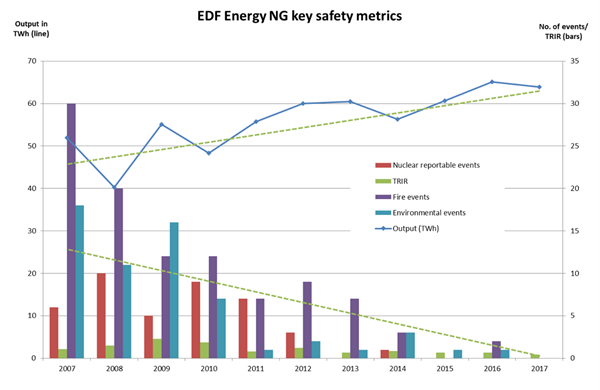EDF Energy owns and operates the UK’s eight operational nuclear power stations - providing 9GW of capacity and around 20% of the UK’s electricity from 14 advanced gas cooled reactors (AGR) and one pressurised water reactor (PWR). Here we spoke to Brian Cowell, Managing Director, EDF Energy Generation, who has executive responsibility for EDF Energy’s nuclear, coal and gas operations. Previously Station Director of Hunterston and Torness Power Stations, Brian joined the Nuclear Generation executive team in 2009 as one of three Chief Nuclear Officers, taking up the role of Director of Nuclear Operations in 2014, before appointment to his current role in 2017.
Brian Cowell comments: “The investment EDF Energy has made in producing excellent leaders has paid enormous dividends for us. In both 2016 and 2017 our teams across the business delivered overall fleet safety and operational performance at historically best ever levels. Many of our plants, which were commissioned between 1976 and 1995, produced more annual output with better safety outcomes than they have done in any of the preceding 40 years.”

Brian states: “The graph above shows the fleet performance over the past 11 years, with safety indicators such as Nuclear Reportable Events improving considerably and plant output levels increasing as a result. It demonstrates that safety drives performance improvement.
We have done a lot of other work on our safety, human performance, governance, engineering, work management, investment and oversight processes, but it has been excellent people - led by great leaders - who have been the catalyst for the change.
Through our leadership programmes, leaders at all levels in the organisation were empowered to find ways to align the parts of the business they controlled with the business objectives. A genuine collective sense of purpose became more and more visible and a common language was created that connected different parts of the business, breaking down organisational silos and creating a ‘one team’ environment.
In 2008 we were experiencing a mixed performance across the fleet, some plants were having significantly higher plant losses and more safety events than others. We had been working hard on improving our technical processes over the preceding five years, and although our overall performance improved, we knew we could do even better by helping every plant deliver to their full potential.
We decided to launch the EDF Energy Leadership Academy, believing excellent leadership would be the catalyst for the change. I remember at the time we discussed whether we should make it compulsory for our top 400 managers to attend and decided that was not appropriate, our view then was that the leadership programmes needed to be so good that people would leave them informed and energised and encourage colleagues to sign up.
We were very pleased that more than 95% of our managers committed to attend and we were often faced with backlogs of applicants. Not only did most managers attend, but to date more than 2,000 people in different positions of leadership or influence have attended from a wide range of disciplines - including engineers, operations shift supervisors, first line supervisors and people on our talent development programmes as well as our contract partners (suppliers).
So what made the leadership programmes so effective? Firstly, it was fully supported by the Executive Team. As an example, myself, the CNOs, station directors and plant managers took time out to deliver some key trainings modules. All plant managers attended as delegates, as did the entire management team of each plant. We shared our stories and experiences with the leaders of the future. It was hard work travelling to all the venues, but it was also great fun! Additionally, each day, managers from the plant visited the programme to give encouragement and show their support to their staff.
Secondly, we mixed up people creating the ‘vertical slice’ concept. This meant that different levels of leaders from different functional areas all learnt together. This broke down barriers and silos, created friendships and allowed a sharing of experience across each cohort. There was a good social element to the programme, with management teams joining for dinner with the cohort and enjoying evening activities together.
Lastly, was the ’action learning’ where people applied the knowledge back at work under the guidance of a mentor. Each cohort was given a ‘director’s challenge’ where they were set to work to solve a real plant problem. Often these solutions paid for the entire cost of the programme!”
Brian concludes: “So, what do I think was the most important leadership subject taught on the programme that made the difference? I believe it was the ‘power of positive reinforcement’, based on the work by Dr Aubrey Daniels. I am a strong believer that we can get so much more out of people if we look at all the good work they do and recognise it. I believe a positive attitude is what is needed in our industry. I accept this is hard when our focus on safety drives us to be very critical, but my experience is positivity works!
Our performance improvement has sustained our company through difficult market conditions and our excellent safety record has been essential in ensuring the support of the British people and Government as we embark on the construction of a new generation of nuclear power plants in the UK.
I am delighted to say the work we did with our leaders has transformed the UK business and helped create a positive future.”